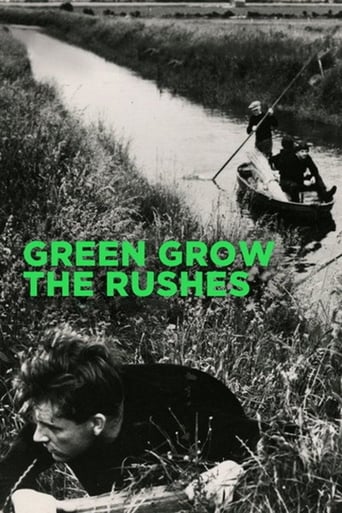HotToastyRag
If it can happen to Richard Burton, it can happen to anyone. It was early on in his career, so thankfully, everyone was able to forget about this one after he made My Cousin Rachel the following year. Green Grow the Rushes is a very silly movie, one that you wouldn't expect a Shakespearean actor to make.A group of men try to smuggle brandy in through old smuggling ships, but a young female reporter tries to get in their way by sort of pretending she doesn't know what they're up to, but then admitting she knows and is going to write a newspaper article about it, but then forgets her plan altogether because Richard Burton flirts with her. It's a little confusing, but then again, you won't really care about the plot enough to really try to figure it out. It's very silly, and I wouldn't really recommend it.
phibes012000
British comedy about a marsh community with a little secret. Some government snooties bounce into town to boss folks around, but the joke is on them. The entire community is involved with booze smuggling, and they're not about to give it up. Richard Burton and Honor Blackman are among the cast. Favorite part: the fate of the little clipper ship full of booze as it encounters a dangerous storm. What does the crew do when faced with being discovered with contraband? They drink it...and wreck the ship. The next morning the ship has been lifted over the sea wall into a farmer's meadow. A movie that makes me smile every time I think of it.
Douglas Skinner
I believe it was G. K. Chesterton who described himself as a "Little Englander." To those of us born after WWII, it is hard to fully grasp what he had in mind; which is the reason why I like Green Grow the Rushes, because I think it gives some idea of what Chesterton meant. It is ostensibly about a boat that became stranded with a load of brandy. But the subtext involves the conflict between officials of the British national government and the locals and their local officials who attempt to thwart the government by invoking laws and immunities dating back to feudal times. In this sense it is a libertarian classic which reminds us that so-called feudal Europe was in fact a complex tapestry of autonomous localities, fiefdoms, principalities, etc., under a relatively weak (by today's standards) central state. The movie manages to convey a sense of nostalgia for a type of little England with its absurdly dressed officials and independent-minded locals who stand in contrast to and are suspicious of the suited technocrats who descend upon them to change their customs and plan their lives.
Rik-19
Is there any documentation on the story of this movie. In other words, how does this derive from the 18th-century English folk song "Green Grow the Rushes" (?) Those words are sung in the second line of each verse. The first verse is, I'll sing you one O. Green grow the rushes O. and so on until the song reaches I'll sing you twelve O... it's a counting song, similar to "The Twelve Days of Christmas." In Kent, the movie's setting, some of the locals are "Lily White," though no reason is given by the movie as to how anyone earns that designation. In the song, each verse (after the first) has the line, "Two, two, the lily-white boys, clothed all in green O." But the original meaning of that is now a matter of speculation.


